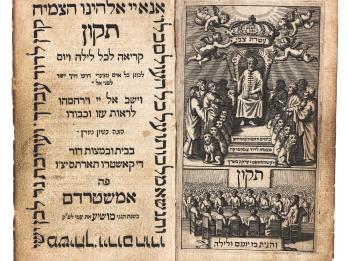Midrash on the Sayings of the Fathers
Anshel Levi
1579
67
There was once a king who built a beautiful palace and hired two painters to paint it to the best of their abilities. He would pay them well.
And the painters said, “We will work diligently and paint as best we can. We will complete it within one year. If we will not complete the painting in one year you may cut off our heads, without verdict and right.”
So the painters united together. One would paint two walls, one beside the other, and the other painter the two walls opposite. One painter was very prompt in his work and began to paint immediately, and went on to paint in the best way that he could. He painted all sorts of forms of animals, beasts, and birds, and all forms that one can imagine, and did so as best he could and diligently; his two walls would be ready before the allotted time. The other painter was slow and unhurried and was lazy in his work. And he thought to himself that a year is a long time, “I have a lot of time and little to paint.” And so he continued until he had little time left, only nine or ten days. Then he was afraid and fearful that the king would be angry and would cut off his head. And he began crying and beating himself and wailed, “Woe, what will become of me?” When he saw his friend, the painter was very happy, and everyone praised him, and they talked about him, how he would be humiliated. Thus, he was very miserable. And in his great crying and wailing he was inspired to make a painting and to smooth the stone of the walls so that it would be as smooth and transparent as a mirror of glass. And so he went nimbly to the palace to smooth the walls that he was supposed to paint. And he hung a curtain in front of it so that no one would see what he was painting. And he smeared the walls with his paint and then he smoothed it and smeared it with oil so that it would be as transparent as the best mirror, so that one may see himself in it and see everything in front of it, exactly as in a mirror. When the year was over, the king came with his ministers to see what the two painters had painted in the palace. When he saw the two walls that were painted with all kinds of mastery, as beautiful as one can and may imagine, the king was very happy. And immediately he ordered that they pay the painter his entire wages, everything, so there would be no claims. Then the king asked the other painter: “What have you done?” So he answered, “My lord king, come behind the curtain. Then you will see what I have painted.” And so he led him behind the curtain. There the king saw nothing, apart from the walls which were smooth and shining; and saw no painting. The king became angry and said, “What have you done? You have not painted.” Then the painter saw that the king was angry, so he went quickly and pulled up the curtain. Then they saw on the same walls everything that was depicted, all the figures which his friend had painted for an entire year. They could see them all in one blink of the eye on the walls which he had made so smooth. They were more beautiful and better, even more than the paintings themselves, so one cannot describe the great wonder that the painter had created in such a short time. Not only did one see all that was painted on the other walls, but one also saw everything in the palace, and everything that one uses and brings into the room, one saw it exactly as though it had been painted on the wall. When the king saw this, he was even happier than before. And all the ministers with him were amazed by the great wonder of the walls. And he loved the other painter and gave him his wages and granted him more in addition; much more than the first painter. For three reasons: first, everything that was painted on the other walls looked more beautiful and better, as is the way of a mirror. Second: one can see therein everything that one uses in the palace. Third: because therein one can and may see what they will bring into the palace in the future. This too one can see therein. And therefore the king preferred the second painter and praised and honored him more than the first.
I have written this story because, as our sages write, it is better to be a repentant sinner than one who has been a saint all his days. [ . . . ] He has a better reward in the next world.
This is proved by the story. Understand the simple meaning! I am tired of writing.
Credits
Published in: The Posen Library of Jewish Culture and Civilization, vol. 5.



